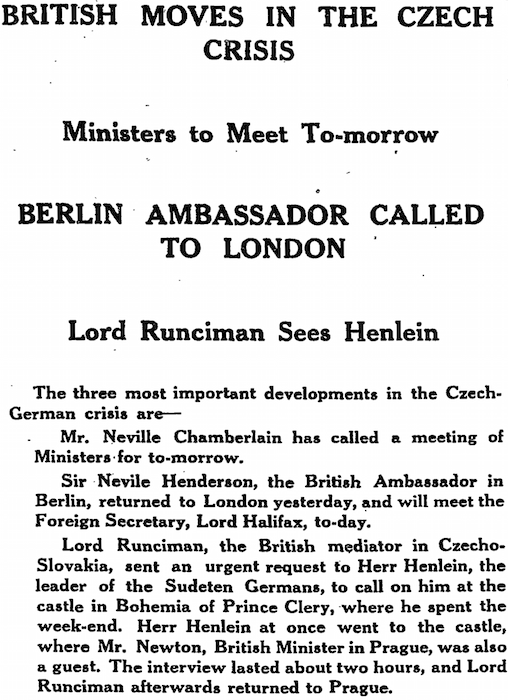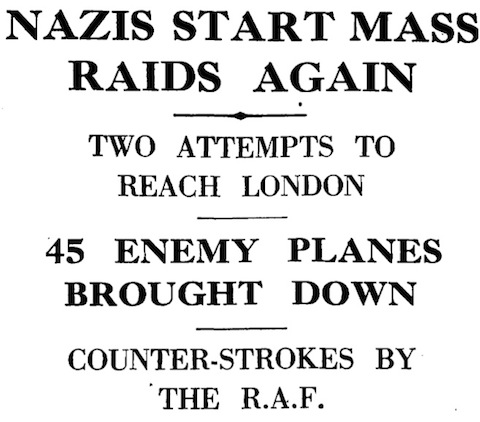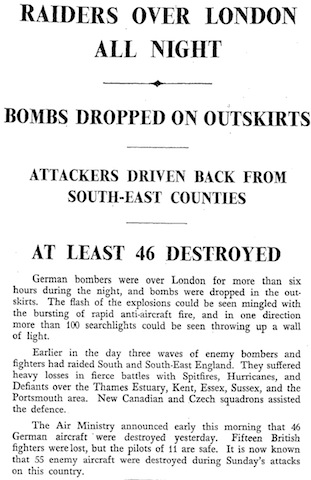
Since yesterday’s Observer was actually put to bed on Saturday night, it missed out reporting the German raid on London in the following hours. Of course, most of London would have already known of it thanks to the alerts and the explosions, while the rest of the country would have heard about it on the BBC. So the morning papers are generally going to be a bit behind in reporting night raids.
Not that there was much for the Manchester Guardian to report (5) in this case, apparently. A man from the Ministry of Home Security had a look at the damage and concluded it was quite small, with only four people killed.
It would be quite wrong, he said, if anybody got the impression that this raid on London caused anything approaching devastation […] The raid was singularly unsuccessful in spoiling London’s war effort or in terrorising the populace. A.R.P. workers were full of praise for the general coolness of the public.
Another article on the same page reports that
Crowds in the streets made for shelters quickly. Many of the people who flocked to Underground stations were asked if they were travelling. Those who were not were told to go to the nearest public shelter.
Though the Manchester Guardian devotes one of its leading articles to transport and air raids (4), it doesn’t comment on people being turned away from Tube stations but is more interested in whether buses should keep running during a raid. Possibly because Manchester doesn’t have an Underground.
Specific locations of places bombed aren’t given, but a reporter in Fleet Street watched as ‘one or two of the German bombers broke through’ and, as they had boasted a couple of days ago, ‘bombed what is technically the City of London’. This is about the only mention of the raid’s novelty. A City church, a couple of warehouses and some houses were damaged.
Like the Observer, the Guardian tries to work out what Hitler’s aims are. Its military correspondent, John Charteris, thinks (8) that the general lack of activity by the Luftwaffe during the last week, and in particular its shift from coastal targets to inland targets, suggests that the invasion is off. But the second leading article (4) instead suggests that whether or not the Germans will now attempt to bomb industrial targets by night, their ultimate goal remains the same: ‘to destroy so much of our Air Force as to establish superiority for Germany in the air’. This ‘alone will make decisive results in the end possible’. But on last weekend’s evidence they will find this very difficult.
It’s not only the Germans (or the Guardian) who are thinking ahead. The Union of Democratic Control has issued an open letter (6) calling on the British government to publicly state its war (or rather peace) aims, partly to distinguish the free world from the totalitarian states, but also to give hope and inspiration to those oppressed by the Nazis and the Fascists. There’s an impressive list of left-wing signatories, including (but not limited to) H. G. Wells, Harold Laski, Kingsley Martin, C. E. M. Joad, Leonard Woolf, and Olaf Stapledon (!) But Bernard Shaw refused to sign, as he believed that ‘We are a completely enslaved nation, thanks to capitalism, adult suffrage, and the party system in Parliament […] Democracy is impossible without Socialism and Communism’. Capitalism, sure, the party system, okay, but what on Earth does he have against adult suffrage?
![]() This work is licensed under a Creative Commons Attribution-NonCommercial-NoDerivatives 4.0 International License.
Permissions beyond the scope of this license may be available at http://airminded.org/copyright/.
This work is licensed under a Creative Commons Attribution-NonCommercial-NoDerivatives 4.0 International License.
Permissions beyond the scope of this license may be available at http://airminded.org/copyright/.





“The idealization of [adult sufferage] is as dangerous as that of kings and priests…” or something like that. Also, he apparently doesn’t like Ibsen.
And he’s clearly rich enough to afford a very patient stenographer and no editors.
So I see! Well, it’s not like GBS was averse to riding hobby horses.